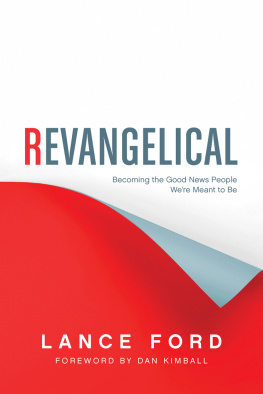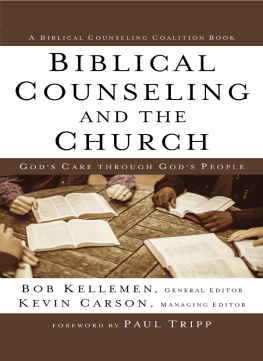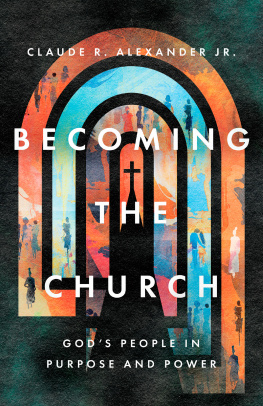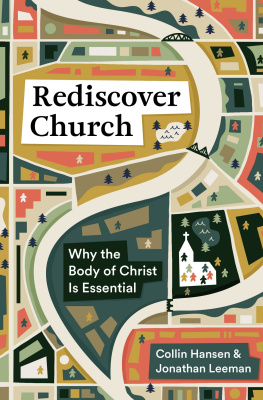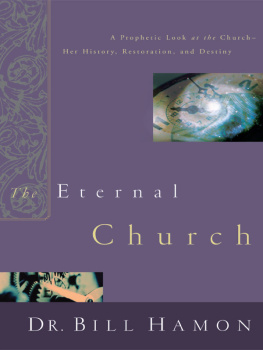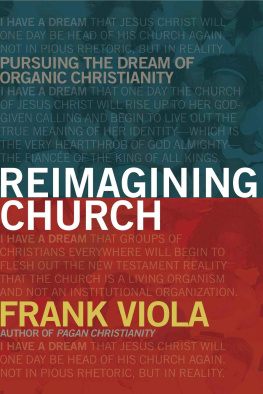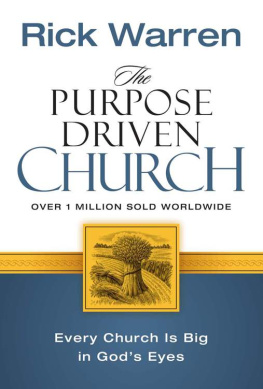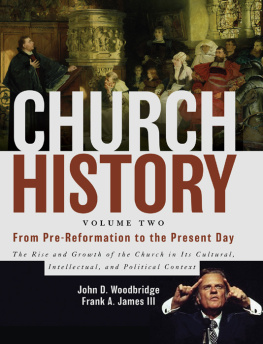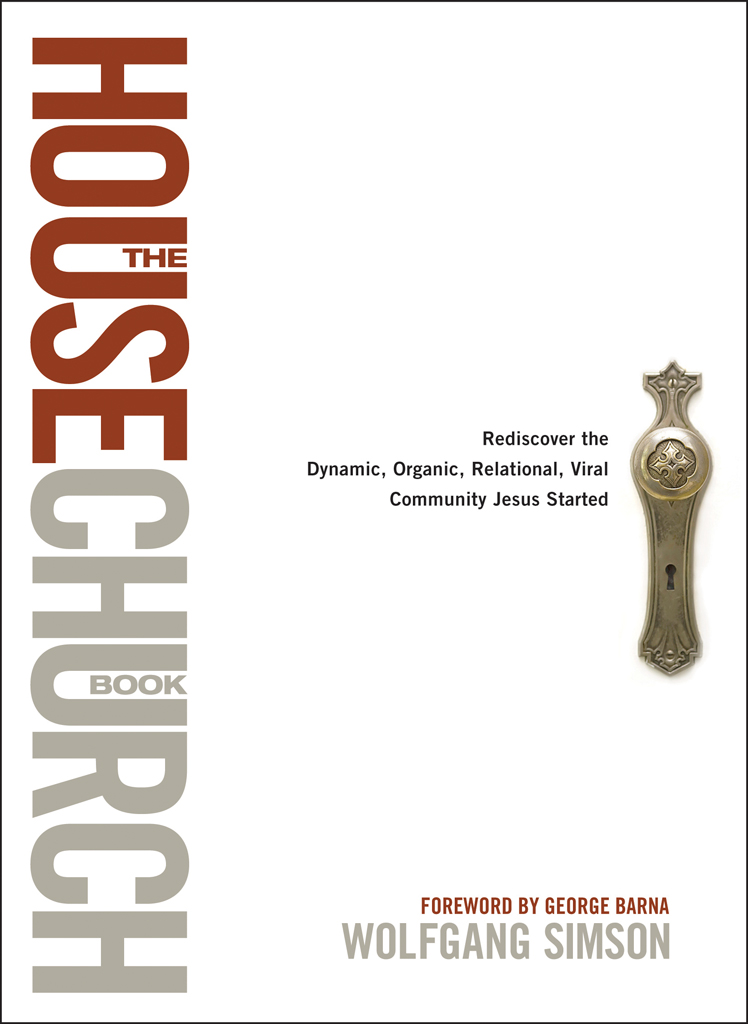Visit Tyndales exciting Web site at www.tyndale.com
Visit the authors Web site at http://www.starfishportal.net
TYNDALE is a registered trademark of Tyndale House Publishers, Inc.
Barna and the Barna logo are trademarks of George Barna.
BarnaBooks is an imprint of Tyndale House Publishers, Inc.
The House Church Book: Rediscover the Dynamic, Organic, Relational, Viral Community Jesus Started
Copyright 2009 by Wolfgang Simson. All rights reserved.
Cover photo copyright by Steve Goodwin/iStockphoto. All rights reserved.
Author photo copyright by Mercy Simson. All rights reserved.
Designed by Ron Kaufmann
All Scripture quotations, unless otherwise indicated, are taken from the HOLY BIBLE, NEW INTERNATIONAL VERSION. NIV. Copyright 1973, 1978, 1984 by International Bible Society. Used by permission of Zondervan. All rights reserved.
Scripture quotations marked NASB are taken from the New American Standard Bible, copyright 1960, 1962, 1963, 1968, 1971, 1972, 1973, 1975, 1977, 1995 by The Lockman Foundation. Used by permission.
Scripture quotations marked NKJV are taken from the New King James Version. Copyright 1982 by Thomas Nelson, Inc. Used by permission. All rights reserved. NKJV is a trademark of Thomas Nelson, Inc.
Library of Congress Cataloging-in-Publication Data
Simson, Wolfgang.
The house church book : rediscover the dynamic, organic, relational, viral community Jesus started / Wolfgang Simson.
p. cm.
Includes bibliographical references.
ISBN 978-1-4143-2552-1 (hc)
1. House churches. I. Title.
BV601.85.S56 2009
262.26 dc22 2009013141
Build: 2015-09-30 16:18:58
There are three movements to which I dedicate this book:
The revolution , led by people who, inspired by the Kingdom, start fresh fires and are bringing the presence of Christ where the church currently is not and rightly doing so without asking anyones permission other than the Kings. Do something unheard of for your King, but remember, church history did not start with you.
The reformation , led by people who find themselves within existing church and mission structures. You have heard from the same Holy Spirit that it is absolutely time to press on, rediscover fascinating aspects of a viral church that you never knew, and intentionally align yourselves with the Kingdom, no matter where you started your journey. Some of your heritages are pure gold, others may need to fade away; so pass on the divine legacy and walk together with the revolutionaries, hand in hand.
The retirement, led by people who dont fit into either of the two groups above. Maybe you long ago stopped asking questions and simply do what you do because thats the way its always been done. But what if God is not finished with you? What if there is still an unsung song in you, an unfinished job waiting for you, an orphaned generation that remains unparented without you? What would happen if you asked God for His strength to help you fly like an eagle once more and add your wisdom to the two movements above?
Foreword
It is exciting to meet someone who is both a solid thinker and a fearless follower of Christ. Wolfgang Simson is such a person. And the book you are holding in your hands is further evidence of both of those qualities.
Its not often that you get a book whose cost can be justified by the content in the pages before you even get to the introduction! The House Church Book is one of those unusual resources. I found the 15 Theses toward a Re-Incarnation of Church to be such a section. I suppose you could consider the bulk of the book a bonus. No matter how you look at it, Wolfgang has provided us with an outstanding resource that, like his earlier book (Houses That Change the World), pushes us to rethink some of our foundational assumptions about who we are in Christ and what it means to be part of the body of Christ.
This is a book that will either excite you or disturb you or maybe both. Wolfgang is a provocateur with a heart dedicated to Jesus. As such, he does not settle for simplistic blather. Consequently, he has written a book that implores us to think about the church in terms of faith rather than formulas, people rather than programs and professionals, biblical principles rather than cultural pragmatism, humility rather than hubris, and simplicity rather than superficiality. Even if you cheer everything he describes and prescribes, you should also find yourself uncomfortable given the state of the church today. It is my prayer that such an emotion is a holy discomfort in which Gods Spirit is nudging you to new realizations that enable you to be a healthy contributor to His ever-developing church.
Wolfgangs work is hopeful and honest. It is also aggressive in its pursuit of biblical authenticity. Toward that end, this new work describes various components of the house church movement its scriptural basis, advantages, dangers, challenges, and opportunities. If you read the book with an open mind, I think you will find it to be a volume that is biblically sound, culturally relevant, and individually challenging.
Why do I encourage you to retain an open mind while reading The House Church Book? Because so many people these days seem to be closed minded about the revolution of faith and form that we are experiencing around us. Wolfgang helps us to understand the history of the church, its practices and structure, and its implications for individuals, families, and communities. He calls us back to the biblical commands for the family to be a center of faith development and practice, the deployment of our God-given gifts, and the experience of growth through genuine spiritual community.
Who wouldnt want to participate in and benefit from these things? But how many of us are able to hear a message that invites us to reexamine our current practices and assumptions in order to experience the best that God has for us and His Kingdom?
I am grateful to Wolfgang for his single-minded pursuit of God and truth, and for the fruit of that journey that appears on these pages. May you find this book to be every bit as stimulating, upsetting, uplifting, insightful, and freeing as I have.
George Barna
Ventura, California
April 2009
PREFACE
A Vision Too Good to Be True?
Being brought up in Christian Germany with churches everywhere, I always felt that there must be something exciting about the community that Jesus started in the New Testament but somehow I could never discover what that was. Together with many friends and colleagues, I dreamed of a community that would be as simple as onetwothree, yet would also be dynamic, explosive, and able to turn a neighborhood and the world upside down. We saw the church as a supernatural invention, endowed with Gods gift of immortality a means to disciple each other, and to make the life of Jesus rub off on each other. We saw it as an experience of grace and grapes, love and laughter, joy and jellybeans, forgiveness and fun, power and yes, why not? paper. Notes, books, sheets we knew that could not be all there is to church.
We dreamed of a church that wouldnt need huge amounts of money, or rhetoric, or control, or manipulation. A church that was nonreligious at heart, thrilled people to the core, and made them lose their tongues out of sheer joy and astonishment. A church that would simply teach us The Way to live. A church that not only had a message,


